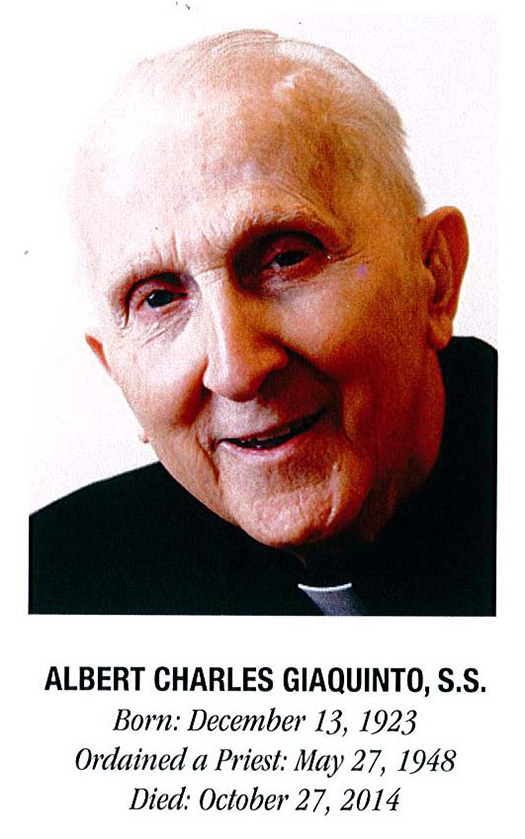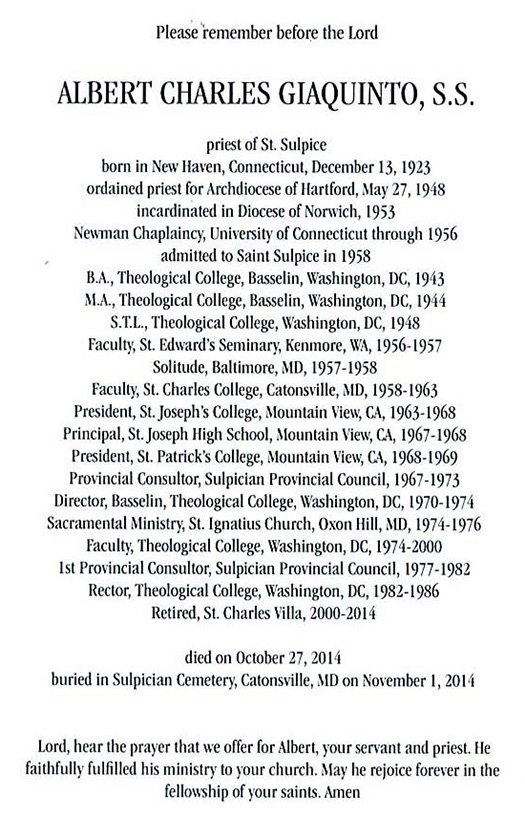Giaquinto, Father Albert Charles, S.S.
2014, October 27
Date of Birth: 1923, December 13
American writer, May Sarton, wrote “Love is the great enlarger of the person because it requires us to ‘take in’ the stranger and to understand him, to exercise restraint and tolerance as well as imagination to make the relationship work.” Such love was clearly manifest in Fr. Al Giaquinto’s life through his gift for relationships. Fr. Giaquinto had a genuine interest in others and a willingness to make relationships work. Through the profound wisdom gained from a lifetime of prayer and service, he knew how to make friends and to make loyalty last.
When speaking about his childhood and family life, Fr. Giaquinto often referred to how his Italian immigrant parents lived under the dark cloud and burdens of financial challenges. But despite such stress as the sixth of eight children born in New Haven, Connecticut on December 13, 1923, Fr. Giaquinto would still describe his early life as marked by love, unity and an intense faith rooted in parish life and family piety.
As he began to discern his vocation to the priesthood, Fr. Giaquinto entered the seminary sponsored by the Archdiocese of Hartford. He eventually was assigned to Theological College first as a Basselin Scholar and then as a theologian graduating with a M. A. in Philosophy (1944) and an S.T.L. from The Catholic University of America in 1948. Fr. Giaquinto was ordained a priest on May 27, 1948, for the Archdiocese of Hartford. He was later incardinated into the newly formed Diocese of Norwich in 1953.
After ordination Fr. Giaquinto was given the opportunity to serve as the Newman Chaplain at the University of Connecticut, an initial pastoral immersion that gave birth to many of his priorities as a priest and as a future Sulpician. Later in life he often celebrated the many blessings he experienced from his large extended family, the educational opportunities offered at The Catholic University of America and Theological College, and the insights gained from the students he served at the University of Connecticut—insights that became the catalyst for his discernment of a call to serve the Church and the priesthood as a Sulpician.
Although a quiet, self-effacing and reserved man who preferred to be in the background, almost from the beginning of his ministry as a Sulpician, Fr. Giaquinto was asked to move into the foreground. Teresa of Avila once wrote, “When one reaches the highest level of maturity, one has only one question left: how can I be helpful?” Fr. Giaquinto answered that question by years of service in the foreground of the Sulpician life and apostolate. After serving on the faculty of St. Edward’s Seminary, Kenmore, WA (1956-1957) and then St. Charles College, Catonsville, MD (1958-1963), he was made President of St. Joseph’s College, Mountain View, CA (1963-1968) and Principal of St. Joseph’s High School Seminary (1967-1968). He followed that with another year in administration by serving as the President of St. Patrick’s College in Mountain View, California (1968-1969). Fr. Giaquinto then moved back east to Theological College in Washington, D.C. There he was made Director of the Basselin program (1970-1974) and then Rector (1982-1986).
He assumed these administrative positions during times of intense societal and ecclesial change. In every instance, Fr. Giaquinto proclaimed God’s message of truth, responsibility and justice by what he said and by what he did. For example, during the Vietnam War, he assisted those collegians leaving the seminary program to apply for conscientious objector status, even though his guidance evoked criticism. Within the Province, he questioned its commitment of resources to high school seminaries. At age 44, he assumed the responsibilities of a Provincial Consultor (1967-1973) as the Province began to implement the changes in priestly formation mandated by the Second Vatican Council.
He was then elected again as First Consultor (1977-1982) with a new generation of leaders. In 1971, he designed and implemented the first external forum formation relationship in a Sulpician seminary. Throughout all of these activities, Fr. Giaquinto lived a life of radical simplicity.
Fr. Giaquinto’s leadership priorities, the questions he raised and the guidance he offered throughout his life sometimes evoked resistance and complaint, but he remained steadfast and resilient as he endeavored to remain faithful to the pastoral priorities that invited him to consider the ministry of priestly formation so early in his life. Many experienced him as a humble, kind, dignified and thoughtful person and priest. Fr. Giaquinto was widely admired for his holiness, a man who preferred to be in the background but responded wholeheartedly when called into the foreground. As many came to know, when the time came when Fr. Giaquinto chose to speak either privately or publically, everyone stopped what they were doing, shut up, sat up, and listened as he gently spoke the truth. He had a way of saying certain things that only he could get away with saying. Whether as a Rector, Provincial Consultor, formation advisor, or spiritual director, the evocative words of St. John of the Cross capture the impact of his life as a leader and as a guide: “They can be like a sun, words. They can do for the heart what light can for a field.”
Above all else, generations of priests and seminarians highlight Fr. Giaquinto’s gift for relationships. To these he brought his soft voice, welcoming manner, and sense of humor. Few escaped his friendly and affirming moniker, “fathead.” Those who worked with him on various faculties knew his willingness, even in the most difficult of circumstances, to lead by persuasion rather than by force, with a capacity to evoke communion in communities of strong willed and argumentative Sulpician confreres, faculty colleagues and seminarians. Fr. Giaquinto also brought a sensitive pastoral presence to an entire seminary community, including not only the administrative staff, but also the kitchen and cleaning staff as well.
In a special way during his thirty years of ministry at Theological College, he was noted for his unique gift for accompanying multiple generations of seminarians and priests as they discerned God’s will for them. His open, non-judgmental and loving manner as a spiritual director and formation advisor was for so many a living reminder of God’s gentleness, healing and mercy.
In 2000, Fr. Giaquinto retired to St. Charles Villa where he spent the evening of his life gracing the retirement community with his signature style of a peaceful presence. He died on October 27, 2014 in Gilchrist Hospice. On November 1, 2014, Fr. Giaquinto was buried in the Sulpician cemetery in Catonsville, MD following the funeral liturgy at the Chapel of Our Lady of the Angels in Charlestown. At his Mass of the Resurrection, the Superior General, Very Reverend Ronald D. Witherup, S.S. presided, Fr. Gerald McBrearity, S.S. of Theological College was the homilist, and the Provincial Superior, Very Reverend Thomas Ulshafer, S.S. led the committal service at the graveside.
For Fr. Giaquinto love was the verb of his faith, and in the words of John of the Cross “In the evening of life we will be judged by love alone.” For him, love showed itself daily in the multiple ways that he “took in” the other, forever exercising understanding, tolerance, restraint, and imagination to make the relationship work. We give thanks for his long and fruitful life that transformed the lives of so many by his wisdom honed from a lifetime of prayer and service.
Rev. Gerald D. McBrearity, S.S.
Vice-Rector, Theological College


